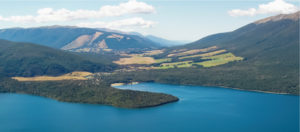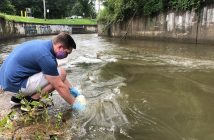Major tourism, conservation and recreation organisations behind the Freshwater Rescue Plan believe Labour’s water policy still has some leaks.
Labour’s freshwater policy is much more ambitious than the current government’s approach to protecting the country’s rivers and lakes but still has some leaks in it, according to Greenpeace, Tourism Export Council of NZ, Fish & Game, Forest & Bird, and Choose Clean Water.
The Freshwater Rescue Plan is a set of seven steps to clean up New Zealand’s rivers, lakes and groundwater that was launched by experts and leaders from the tourism, science, public health, recreational and environmental protection sectors.
The seven steps are:
- Protect the health of people and their waterways by setting strict and enforceable water quality standards, based on human and Ecosystem health limits.
- Withdraw all public subsidies of irrigation schemes as they increase pressure on waterways
- Invest in an agricultural transition fund, to support the country’s shift away from environmentally-damaging farming methods by redirecting $480 million of public money earmarked for irrigation.
- Implement strategies to decrease cow numbers immediately
- Reduce freshwater contamination by instigating polluter pays systems nationally
- Address the performance of regional councils on improving water quality through quarterly reports from the ministry for the environment on enforcement, breaches and monitoring.
- Adopt the OECD recommendation to establish a “whole-of-government multi-stakeholder process to develop a long-term vision for the transition of New Zealand to a low-carbon, greener economy.”
Greenpeace, Tourism Export Council of NZ, Fish & Game, Forest & Bird, and Choose Clean Water have assessed Labour’s 2017 water policy against the seven steps and found that, while it is performing well on some, thee approach has been found lacking on others.
Labour’s commitment to stricter freshwater regulation, enforcement and monitoring was applauded as was their inclusion of limits for two major pollutants, phosphorous and sediment, which have been completely left out of National’s policy, and their focus on swimmable rivers.
However, the organisations would like to see more detail on the exact standards Labour is suggesting for major pollutants particularly faecal contamination (measured by E.coli), nitrogen, phosphorous as these can undermine the health of waterways and risk human health.
Labour has also committed to ensuring that increases in the intensity of land use for livestock would now need a resource consent.
“While this is a step in the right direction a more explicit commitment to decrease the national dairy herd is needed,” the organisations believe.
It is understood that Labour will be releasing a separate water allocation policy in which the issue of irrigation will be addressed.
“It is an absolute bottom line for our freshwater that political parties commit to stopping all public subsidies to irrigation and we need to see this reflected in Labour’s upcoming allocation policy,” the organisations add.
“We also need to see a robust plan from Labour to lead and fund the transition away from irrigated intensive dairying towards diversified, clean and resilient agriculture and we hope to see this addressed in their primary industries policy.”
Labour has not yet indicated that they will implement a polluter pays system.
Currently, the cost of pollution is largely paid by the public.
“We need central government to make polluters accountable by having them wear the costs,” the five organisations insist. “We hope to see a polluter pays system reflected in Labour’s overall environment policy.”
The final step in the Freshwater Rescue Plan is to adopt the OECD recommendation to transition New Zealand to a low carbon, greener economy.
The organisations hope to see this point addressed by Labour before the election.
“Any prospective government that is serious about stopping the decline of our freshwater systems and restoring health to our waterways does need to take all the steps outlined in the freshwater rescue plan to succeed.”
Labour’s new policy is a step in the right direction, they say. “But it still has some way to go before it will ensure that our river quality doesn’t continue to decline.”
“We hope that as Labour’s other policies are announced this year we see them commit to taking all of the steps outlined Freshwater Rescue Plan,” the organisations conclude.
The organisations behind the Freshwater Rescue plan say they welcome the opportunity to meet with Labour, and all other parties, to discuss the importance of each of the seven steps in the plan and gain a commitment to implementing all of them.




